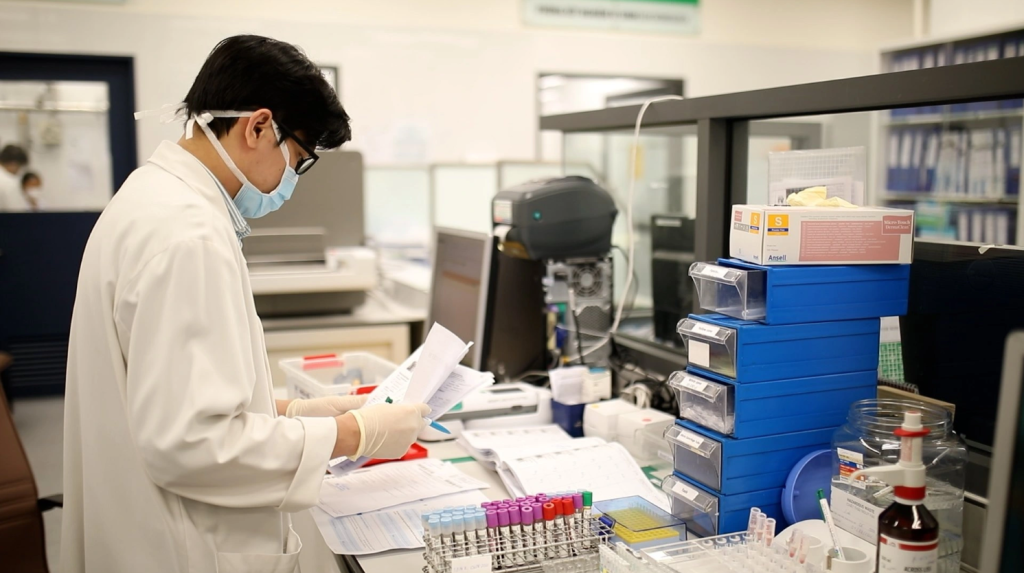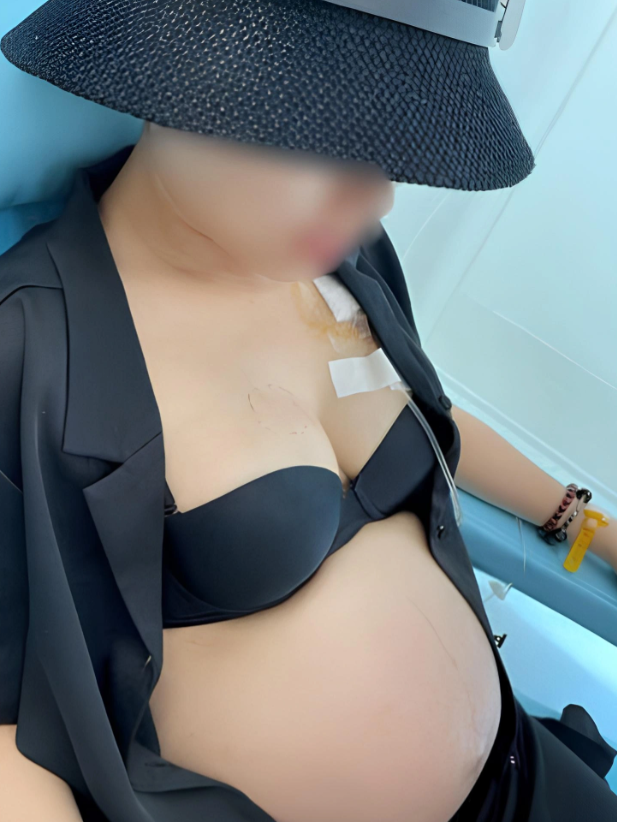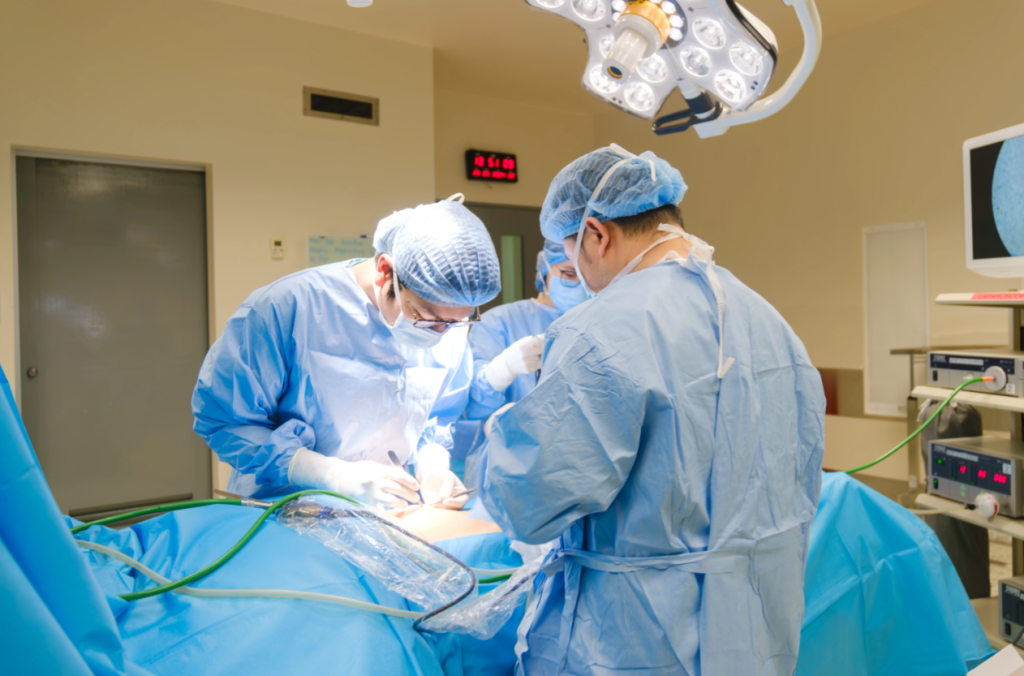At 24 weeks pregnant, Ms LTN, a 30-year-old from Ho Chi Minh City, was diagnosed with locally advanced breast cancer. Oncologists at a hospital advised her to terminate her pregnancy to focus on treatment. Unable to give up the life growing inside her, Ms N. turned to FV Hospital, hoping to find a treatment plan for her critical illness while preserving her pregnancy.
The challenge for FV’s medical team was to deliver timely breast cancer treatment for Ms N. while ensuring the safety of both mother and baby throughout the pregnancy and after.
Cancer Diagnosis During Pregnancy: A Complex Dilemma
In October 2023, Dr Basma M’Barek, Head of the Hy Vong Cancer Care Centre at FV Hospital, took on Ms LTN’s case, who was 25 weeks pregnant at the time. “It was a difficult dilemma: the pregnancy was too far along to consider termination, yet too early to deliver the baby and then focus on treating the mother. We decided to treat the patient while simultaneously ensuring the safety of the unborn baby. This meant a greater challenge because the doctors had to protect two lives at the same time,” Dr Basma explained.
To develop the best treatment plan, FV Hospital organised a multidisciplinary team of obstetricians and oncologists. Given the tumour’s size, surgery was not an option. Instead, the patient underwent low-dose chemotherapy administered every three weeks—a regimen carefully chosen to be safe for the foetus while effectively controlling the tumour’s progression. The goal was to stabilise the cancer until the baby could be safely delivered, allowing for more intensive treatment to follow.
According to global medical literature, certain chemotherapy drugs for breast cancer are safe for the foetus. However, determining the correct dosage for pregnant patients presents a significant challenge. Chemotherapy dosages are typically calculated based on the patient’s weight and height, but in pregnant patients, the weight includes the foetus and amniotic fluid, complicating the calculations. Moreover, chemotherapy often causes side effects such as nausea and vomiting, which can prevent patients from eating for 3-4 days. This can have a severe impact on the foetus’s health.

With extensive experience treating pregnant women with cancer, Dr Basma recognises that prescribing chemotherapy dosages tailored to each individual is critical for the health of both mother and baby. She is also experienced in identifying which molecules can enter the mother’s body without harming the foetus and knows how to minimise the risk of nausea and vomiting in pregnant patients.
Thanks to her clinical expertise and the careful calculations of the entire medical team, Ms N.’s chemotherapy sessions went smoothly. She did not experience nausea or vomiting, ensuring that her baby received adequate nutrition for healthy development. At this point, the mother truly became a brave warrior, with her primary concern being her child’s safety. She followed every instruction from the doctors throughout her treatment journey.

Multidisciplinary Collaboration in Treating Breast Cancer in Pregnant Women: The Key to Success
The treatment plan for the patient required close coordination between the Obstetrics & Gynaecology and Oncology departments. Vo Trieu Dat, MSc, Head of Obstetrics & Gynaecology Department at FV Hospital and the doctor directly caring for Ms N., explained to her that her pregnancy was closely monitored. Both the obstetrician and oncologist were kept fully informed about the health status of both mother and baby. The patient was prescribed medications to support and protect the pregnancy, as well as to reduce the risk of preterm labour. She underwent frequent check-ups and ultrasounds to ensure normal development for the baby.
“To enable the patient to start full-dose chemotherapy as soon as possible, we planned to deliver the baby via caesarean section at 36–37 weeks, when the foetus would be sufficiently developed. Typically, for planned preterm deliveries, two doses of corticosteroids are required to accelerate foetal lung maturation. However, since the mother had already received corticosteroids as part of her cancer treatment regimen, additional doses were unnecessary. Morphological ultrasound results of the foetus at 32 weeks also confirmed no abnormalities,” Dr Dat explained.

With the active care and monitoring of the obstetricians, the foetus developed steadily throughout the pregnancy. At 36 weeks, the obstetricians performed a caesarean section for Ms N. The baby girl was born weighing 2.65kg, healthy, and did not require an incubator. The paediatricians at FV Hospital then provided guidance to the family on how to care for the newborn to ensure the baby’s healthy development.
The mother then underwent intensive chemotherapy to complete her treatment regimen and eliminate the cancer cells. After six months of chemotherapy, the tumour had shrunk, and the patient was scheduled for surgery to have the tumour removed.
“This was an emotional treatment journey for the FV medical team! After treatment and regular follow-ups, imaging tests and examinations showed no signs of recurrence. The baby is now over 1 year old, and both the family and doctors are very happy with this successful treatment outcome,” Dr Basma shared with joy.
Preserving Reproductive Function is Crucial for Young Cancer Patients
According to Dr Basma, breast cancer during pregnancy is rare, but hormonal changes in the body can make detection challenging, often leading to late-stage diagnosis. While women may develop other types of cancer during pregnancy, fortunately, cancer treatment does not always require terminating the pregnancy.
“We still have alternative options to achieve the best outcome for both mother and child,” Dr Basma emphasised. “At FV, we always choose treatment methods that are most beneficial for the patient while ensuring the safety of the foetus. This requires close cooperation between oncologists and obstetricians.”
Dr Basma also mentioned that cancer in young people is becoming increasingly common. Therefore, when treating cancer in young patients, doctors must consider ways to preserve their fertility. At FV Hospital, doctors provide a comprehensive treatment plan that not only targets tumour eradication but also focuses on the patient’s long-term quality of life.

One important side effect of cancer treatment that young people should be aware of is its potential impact on fertility, including the ability to produce eggs or sperm. At FV, the optimal treatment plan always includes options to preserve fertility, such as egg freezing for women and sperm freezing for men. This approach has allowed many patients to experience the joy of parenthood after treatment.
Regarding the timing of having children after cancer treatment, Dr Basma stated, “Typically, patients can conceive after completing cancer treatment for 2 years. However, in some cases, due to age factors, patients may not be able to wait the full 2 years. In these situations, it’s important to discuss their health status with their doctor to find the best solution.”
The Hy Vong Cancer Care Centre at FV Hospital is equipped with advanced technology and follows the latest global treatment protocols personalised for each patient. As part of a multi-disciplinary hospital, the centre can leverage resources from various departments, with patient information centralised, offering significant advantages in delivering accurate and effective cancer treatment.
For more information about cancer treatment at FV Hospital, please contact: (028) 54 11 33 33.

 Vi
Vi 












